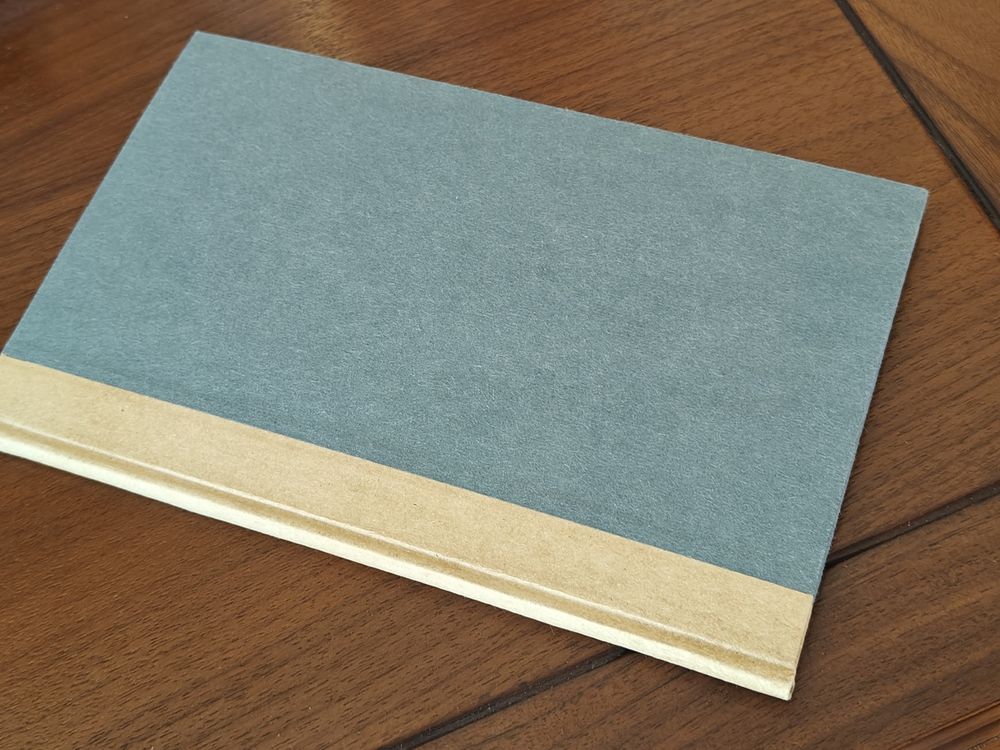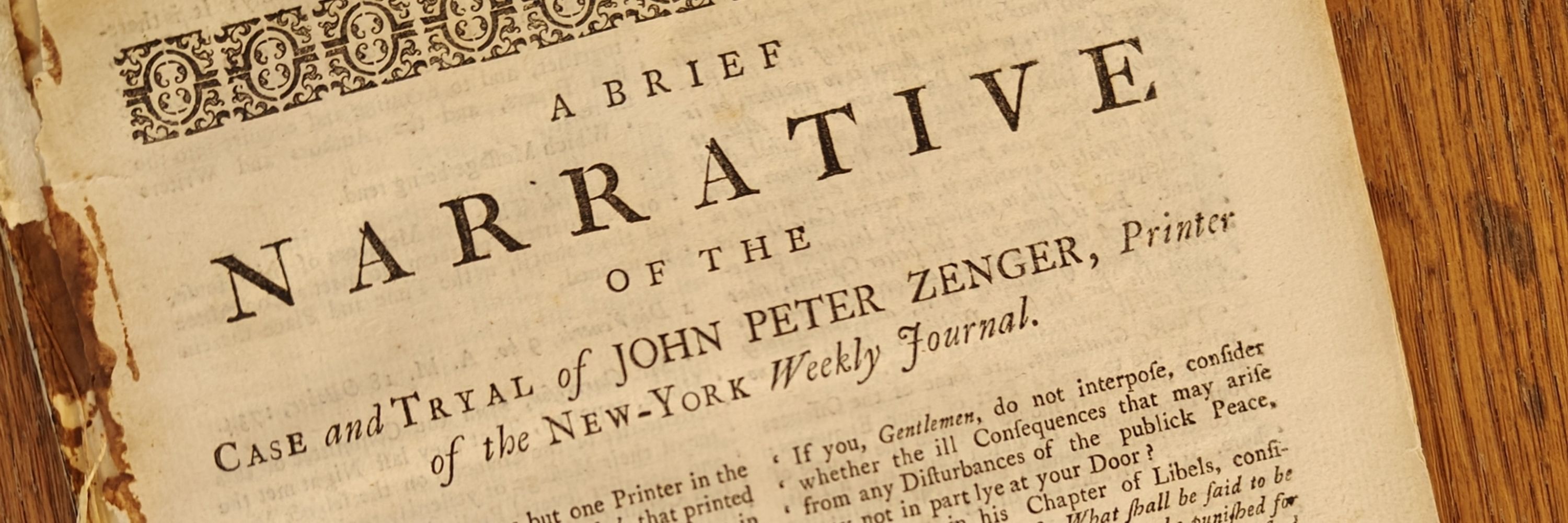
Matthew Schafer
@matthewschafer.bsky.social
Adjunct law prof Fordham Law; Scholar focusing on the intellectual history of press freedom: http://shorturl.at/bhsv7; rare book collector
Bonus book! A beautiful 1797 copy of John Almon’s Biographical, Literary, & Political Anecdotes. The liberty minded printer included an early sketch of Benjamin Franklin — “founder of American Greatness”.
Almon’s press was of singular importance in introducing the British to revolutionary thought.
Almon’s press was of singular importance in introducing the British to revolutionary thought.




September 2, 2025 at 11:04 PM
Bonus book! A beautiful 1797 copy of John Almon’s Biographical, Literary, & Political Anecdotes. The liberty minded printer included an early sketch of Benjamin Franklin — “founder of American Greatness”.
Almon’s press was of singular importance in introducing the British to revolutionary thought.
Almon’s press was of singular importance in introducing the British to revolutionary thought.
I've read the just-issued 11th Circuit opinion in Dershowitz v CNN, I appreciate Judge Wilson bringing to bear a thoughtful defense of Sullivan and highlighting my scholarship as well as that of others in defense of a cornerstone of press freedom...
It's very gratifying seeing scholarship at work.
It's very gratifying seeing scholarship at work.



August 29, 2025 at 9:17 PM
I've read the just-issued 11th Circuit opinion in Dershowitz v CNN, I appreciate Judge Wilson bringing to bear a thoughtful defense of Sullivan and highlighting my scholarship as well as that of others in defense of a cornerstone of press freedom...
It's very gratifying seeing scholarship at work.
It's very gratifying seeing scholarship at work.
So while these books have seen better days, they are literally a part of US history. Tucker's Blackstone was a key resource for understanding how Americans viewed common law in the years following ratification. Masterly, Tucker adapted Blackstone's often anti-democratic work to a young republic.

August 29, 2025 at 3:21 PM
So while these books have seen better days, they are literally a part of US history. Tucker's Blackstone was a key resource for understanding how Americans viewed common law in the years following ratification. Masterly, Tucker adapted Blackstone's often anti-democratic work to a young republic.
Breckenridge had already served as the floor leader for Jeffersonians in Congress. Now he was the chief law enforcement officer in the Country. But, his term was cut short when, in 1806, he contracted tuberculosis.

August 29, 2025 at 3:21 PM
Breckenridge had already served as the floor leader for Jeffersonians in Congress. Now he was the chief law enforcement officer in the Country. But, his term was cut short when, in 1806, he contracted tuberculosis.
In Kentucky, Breckinridge made revisions and introduced the first resolutions. Importantly, he provided a means by which the States should seek repeal and removed language about nullification. In 1799, he shepherded the second set through too.
Despite this, some insisted it was Jefferson's doing.
Despite this, some insisted it was Jefferson's doing.


August 29, 2025 at 3:21 PM
In Kentucky, Breckinridge made revisions and introduced the first resolutions. Importantly, he provided a means by which the States should seek repeal and removed language about nullification. In 1799, he shepherded the second set through too.
Despite this, some insisted it was Jefferson's doing.
Despite this, some insisted it was Jefferson's doing.
Breckinridge was the vehicle for the Resolutions opposing the Alien and Sedition Acts enacted by Congress to keep. He was a main character in a conspiracy hatched to keep Jefferson's involvement a secret, having agreed to get them passed and solemnly promising not to ID Jefferson.

August 29, 2025 at 3:21 PM
Breckinridge was the vehicle for the Resolutions opposing the Alien and Sedition Acts enacted by Congress to keep. He was a main character in a conspiracy hatched to keep Jefferson's involvement a secret, having agreed to get them passed and solemnly promising not to ID Jefferson.
Rare Book Friday! Don't judge a book by its cover! A remarkably scarce 1803 set of Tucker's Blackstone, which redefined law and press freedom in America.
This set is especially rare because of its owner: John Breckinridge, Jefferson's Attorney General who was key to passing the Kentucky Resolutions
This set is especially rare because of its owner: John Breckinridge, Jefferson's Attorney General who was key to passing the Kentucky Resolutions




August 29, 2025 at 3:21 PM
Rare Book Friday! Don't judge a book by its cover! A remarkably scarce 1803 set of Tucker's Blackstone, which redefined law and press freedom in America.
This set is especially rare because of its owner: John Breckinridge, Jefferson's Attorney General who was key to passing the Kentucky Resolutions
This set is especially rare because of its owner: John Breckinridge, Jefferson's Attorney General who was key to passing the Kentucky Resolutions
Somehow class is back in session...

August 27, 2025 at 11:58 PM
Somehow class is back in session...
In 1941, December 15 become BoR Day after Congress requested the FDR so recognize the day.
The first BoR Day was marked by a big production that occurred just a week after Pearl Harbor.
You can listen to the radio broadcast here: archive.org/details/Norm...
The first BoR Day was marked by a big production that occurred just a week after Pearl Harbor.
You can listen to the radio broadcast here: archive.org/details/Norm...



August 27, 2025 at 1:30 PM
In 1941, December 15 become BoR Day after Congress requested the FDR so recognize the day.
The first BoR Day was marked by a big production that occurred just a week after Pearl Harbor.
You can listen to the radio broadcast here: archive.org/details/Norm...
The first BoR Day was marked by a big production that occurred just a week after Pearl Harbor.
You can listen to the radio broadcast here: archive.org/details/Norm...
With Vermont, the number of states required went from 10 of 13 to 11 of 14.
Vermont ratified the Bill of Rights in November, becoming the 10th state. Virginia got its act together on Dec 15, 1791 and ratified, becoming the 11th.
In March 1792, TJ then sent the Fish Letter making the BoR official:
Vermont ratified the Bill of Rights in November, becoming the 10th state. Virginia got its act together on Dec 15, 1791 and ratified, becoming the 11th.
In March 1792, TJ then sent the Fish Letter making the BoR official:

August 27, 2025 at 1:30 PM
With Vermont, the number of states required went from 10 of 13 to 11 of 14.
Vermont ratified the Bill of Rights in November, becoming the 10th state. Virginia got its act together on Dec 15, 1791 and ratified, becoming the 11th.
In March 1792, TJ then sent the Fish Letter making the BoR official:
Vermont ratified the Bill of Rights in November, becoming the 10th state. Virginia got its act together on Dec 15, 1791 and ratified, becoming the 11th.
In March 1792, TJ then sent the Fish Letter making the BoR official:
By August, only 9 states had ratified 10 of the 12 proposed amendments. Thomas Jefferson as Secretary of State was keeping track with this handy chart.
He tracked the states North-to-South, and had to pencil in a "V" for Vermont, which became the 14th state while the BoR was under consideration.
He tracked the states North-to-South, and had to pencil in a "V" for Vermont, which became the 14th state while the BoR was under consideration.

August 27, 2025 at 1:30 PM
By August, only 9 states had ratified 10 of the 12 proposed amendments. Thomas Jefferson as Secretary of State was keeping track with this handy chart.
He tracked the states North-to-South, and had to pencil in a "V" for Vermont, which became the 14th state while the BoR was under consideration.
He tracked the states North-to-South, and had to pencil in a "V" for Vermont, which became the 14th state while the BoR was under consideration.
When was the First Amendment ratified? Dec. 15, 1791, of course, when Virginia became the 11th of 14 states to do so (3/4ths of states)!
Well, things weren't so clear at the Founding. In this Sept. 1791 copy of the Bill of Rights, the editor said ratification occurred by August (it did not!).
Well, things weren't so clear at the Founding. In this Sept. 1791 copy of the Bill of Rights, the editor said ratification occurred by August (it did not!).



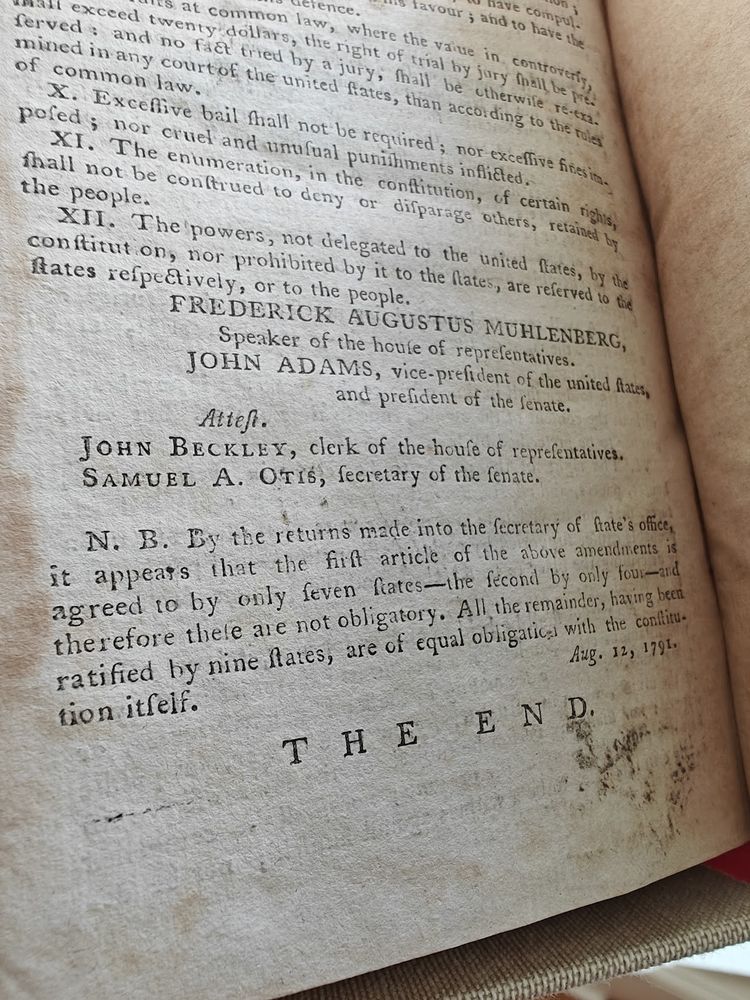
August 27, 2025 at 1:30 PM
When was the First Amendment ratified? Dec. 15, 1791, of course, when Virginia became the 11th of 14 states to do so (3/4ths of states)!
Well, things weren't so clear at the Founding. In this Sept. 1791 copy of the Bill of Rights, the editor said ratification occurred by August (it did not!).
Well, things weren't so clear at the Founding. In this Sept. 1791 copy of the Bill of Rights, the editor said ratification occurred by August (it did not!).
The press in America, Madison wrote, "must be entitled to much more respect. In every State, probably, in the Union, the press has exerted a freedom in canvassing the merits and measures of public men of every description which has not been confined to the strict limits of the common law."


August 22, 2025 at 1:13 PM
The press in America, Madison wrote, "must be entitled to much more respect. In every State, probably, in the Union, the press has exerted a freedom in canvassing the merits and measures of public men of every description which has not been confined to the strict limits of the common law."
While revisionists say that the Report was about states' rights not press freedom, Madison's own words refute that idea. Madison's considers the question at length: "The state of the press under the common law, cannot, in this point of view, be the standard of its freedom in the United States."
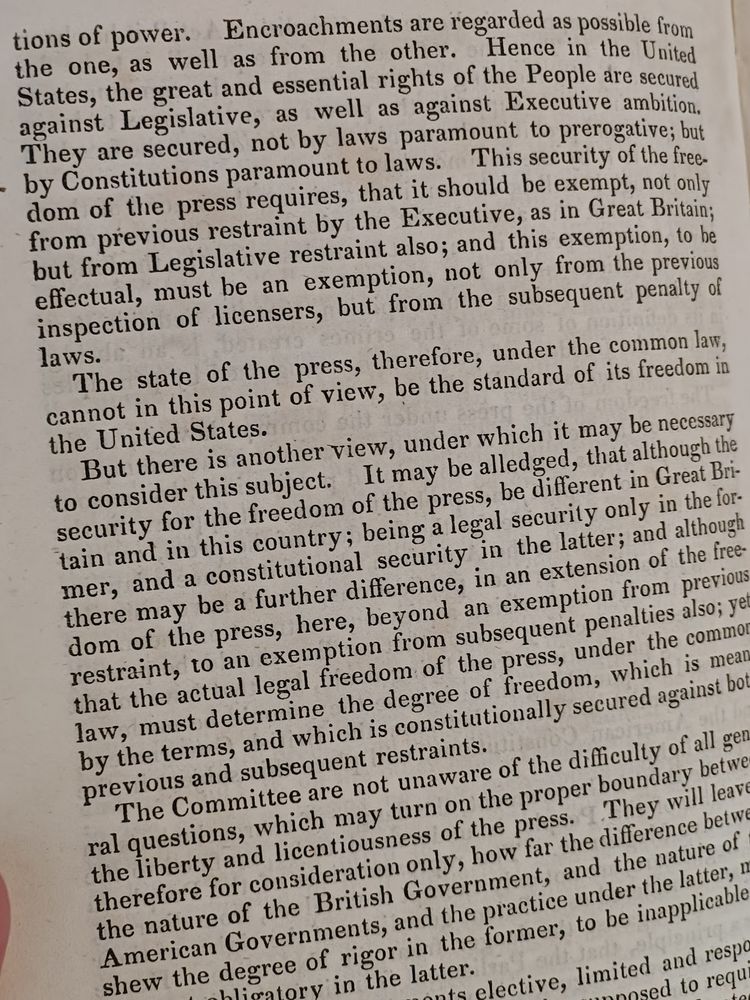
August 22, 2025 at 1:13 PM
While revisionists say that the Report was about states' rights not press freedom, Madison's own words refute that idea. Madison's considers the question at length: "The state of the press under the common law, cannot, in this point of view, be the standard of its freedom in the United States."
Madison's report opposed the Alien and Sedition Acts. It was, 1826 edition said, a "landmark of the Constitution." Though liberty of the press had been invaded, "the Republicans did not abandon the cause of their Country" nor did they "despair."


August 22, 2025 at 1:13 PM
Madison's report opposed the Alien and Sedition Acts. It was, 1826 edition said, a "landmark of the Constitution." Though liberty of the press had been invaded, "the Republicans did not abandon the cause of their Country" nor did they "despair."
The report he enclosed was this edition, printed in Richmond in 1826, the same year he was writing Lafayette--which makes this particular edition all the more interesting.


August 22, 2025 at 1:13 PM
The report he enclosed was this edition, printed in Richmond in 1826, the same year he was writing Lafayette--which makes this particular edition all the more interesting.
Madison responded warmly to Lafayette: "You will never doubt that your happiness is very dear to me; and I feel the sentiment growing stronger as the loss of others dear to us both, shortens the list to which we belong."

August 22, 2025 at 1:13 PM
Madison responded warmly to Lafayette: "You will never doubt that your happiness is very dear to me; and I feel the sentiment growing stronger as the loss of others dear to us both, shortens the list to which we belong."
Rare book Friday! The Kentucky and Virginia Resolutions of 1798.
From his stone chateau one summer day in 1826, Lafayette, the hero of the American Revolution, sat down and scribbled off a note to Madison: "Our Beloved Jefferson is No More, My dear friend." Jefferson died a month earlier on July 4
From his stone chateau one summer day in 1826, Lafayette, the hero of the American Revolution, sat down and scribbled off a note to Madison: "Our Beloved Jefferson is No More, My dear friend." Jefferson died a month earlier on July 4


August 22, 2025 at 1:13 PM
Rare book Friday! The Kentucky and Virginia Resolutions of 1798.
From his stone chateau one summer day in 1826, Lafayette, the hero of the American Revolution, sat down and scribbled off a note to Madison: "Our Beloved Jefferson is No More, My dear friend." Jefferson died a month earlier on July 4
From his stone chateau one summer day in 1826, Lafayette, the hero of the American Revolution, sat down and scribbled off a note to Madison: "Our Beloved Jefferson is No More, My dear friend." Jefferson died a month earlier on July 4
The Letter also attacks the banning of his works, proclaiming "It is a dangerous attempt in any Government to say to a Nation, 'thou shalt not read,'" and arguing against censorship: "because thought, by some means or other, is got abroad in the world, and cannot be restrained, though reading may."

August 19, 2025 at 11:43 PM
The Letter also attacks the banning of his works, proclaiming "It is a dangerous attempt in any Government to say to a Nation, 'thou shalt not read,'" and arguing against censorship: "because thought, by some means or other, is got abroad in the world, and cannot be restrained, though reading may."
Bonus book off the shelf! Thomas Paine's 1792 Letter to the Addressers. Called the Third Part of Rights of Man, Paine wrote the letter while fleeing sedition charges.
"A man," he wrote, "derives no more excellence from calling him King than I should do by changing my name from Thomas to George."
"A man," he wrote, "derives no more excellence from calling him King than I should do by changing my name from Thomas to George."



August 19, 2025 at 11:43 PM
Bonus book off the shelf! Thomas Paine's 1792 Letter to the Addressers. Called the Third Part of Rights of Man, Paine wrote the letter while fleeing sedition charges.
"A man," he wrote, "derives no more excellence from calling him King than I should do by changing my name from Thomas to George."
"A man," he wrote, "derives no more excellence from calling him King than I should do by changing my name from Thomas to George."
Rare book Friday! A 1799 Journal of the Senate of the Sixth Congress.
This particular Journal memorializes the Senate's prosecution of printer William Duane who steadfastly refused to identify his source after Duane printed an article critical of the Senate.
This particular Journal memorializes the Senate's prosecution of printer William Duane who steadfastly refused to identify his source after Duane printed an article critical of the Senate.




August 15, 2025 at 10:44 PM
Rare book Friday! A 1799 Journal of the Senate of the Sixth Congress.
This particular Journal memorializes the Senate's prosecution of printer William Duane who steadfastly refused to identify his source after Duane printed an article critical of the Senate.
This particular Journal memorializes the Senate's prosecution of printer William Duane who steadfastly refused to identify his source after Duane printed an article critical of the Senate.
I missed rare book Friday last week so here's a catch up post:
A 1795 first edition of William Winterbotham's monumental History of America.
Written while Winterbotham was serving a 2-year sentence in Newgate prison for political sermons on the Gunpowder Plot and on the Revolution.
A 1795 first edition of William Winterbotham's monumental History of America.
Written while Winterbotham was serving a 2-year sentence in Newgate prison for political sermons on the Gunpowder Plot and on the Revolution.
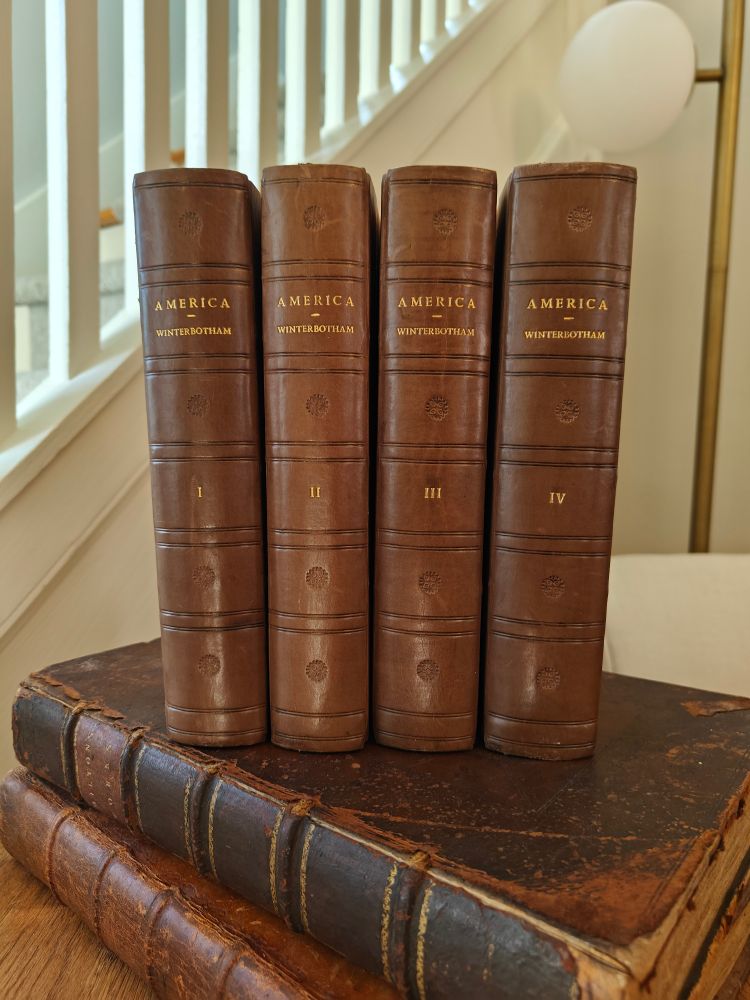



August 12, 2025 at 1:45 AM
I missed rare book Friday last week so here's a catch up post:
A 1795 first edition of William Winterbotham's monumental History of America.
Written while Winterbotham was serving a 2-year sentence in Newgate prison for political sermons on the Gunpowder Plot and on the Revolution.
A 1795 first edition of William Winterbotham's monumental History of America.
Written while Winterbotham was serving a 2-year sentence in Newgate prison for political sermons on the Gunpowder Plot and on the Revolution.
Chat.gpt has rendered by law review article into this picture. Not bad.
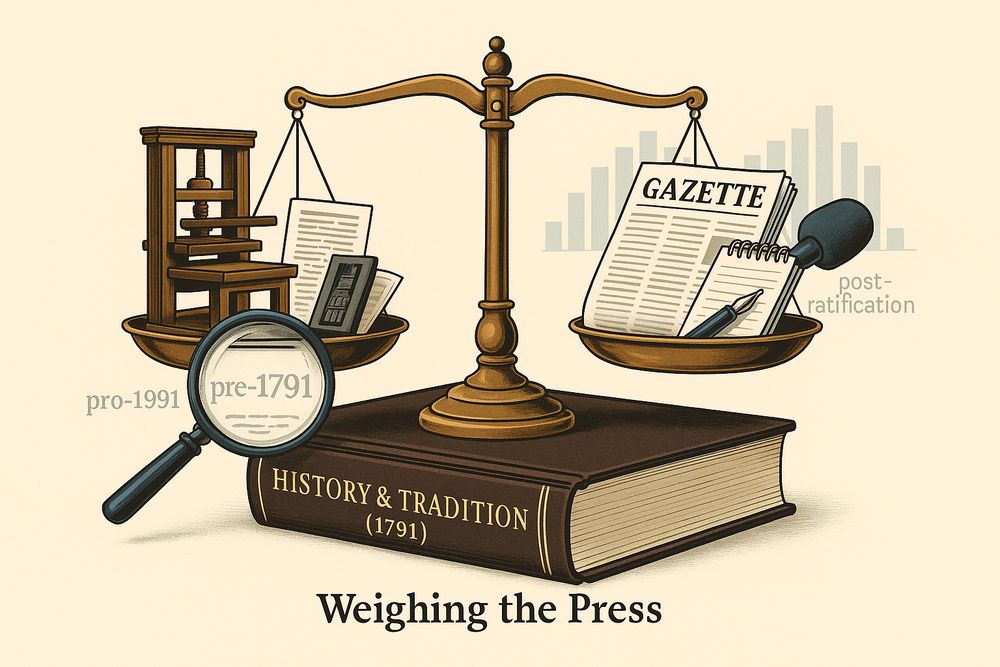
August 8, 2025 at 10:18 PM
Chat.gpt has rendered by law review article into this picture. Not bad.
Hall argued that only overt acts against the government, not "mere" opinions, should be proscribed, adding: "The law hath amply provided against overt acts of sedition and disorder, and to suppress mere opinions by another method than reason and argument, is the height of tyranny."

August 1, 2025 at 12:06 AM
Hall argued that only overt acts against the government, not "mere" opinions, should be proscribed, adding: "The law hath amply provided against overt acts of sedition and disorder, and to suppress mere opinions by another method than reason and argument, is the height of tyranny."


